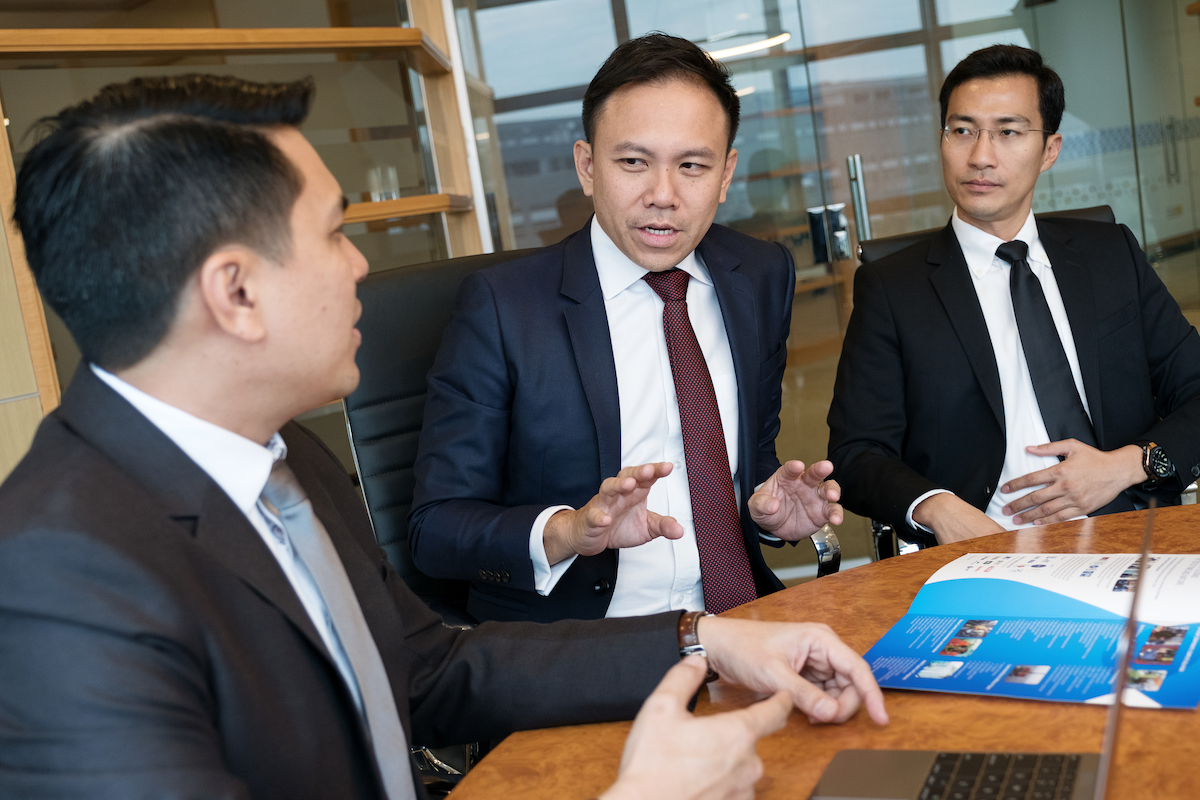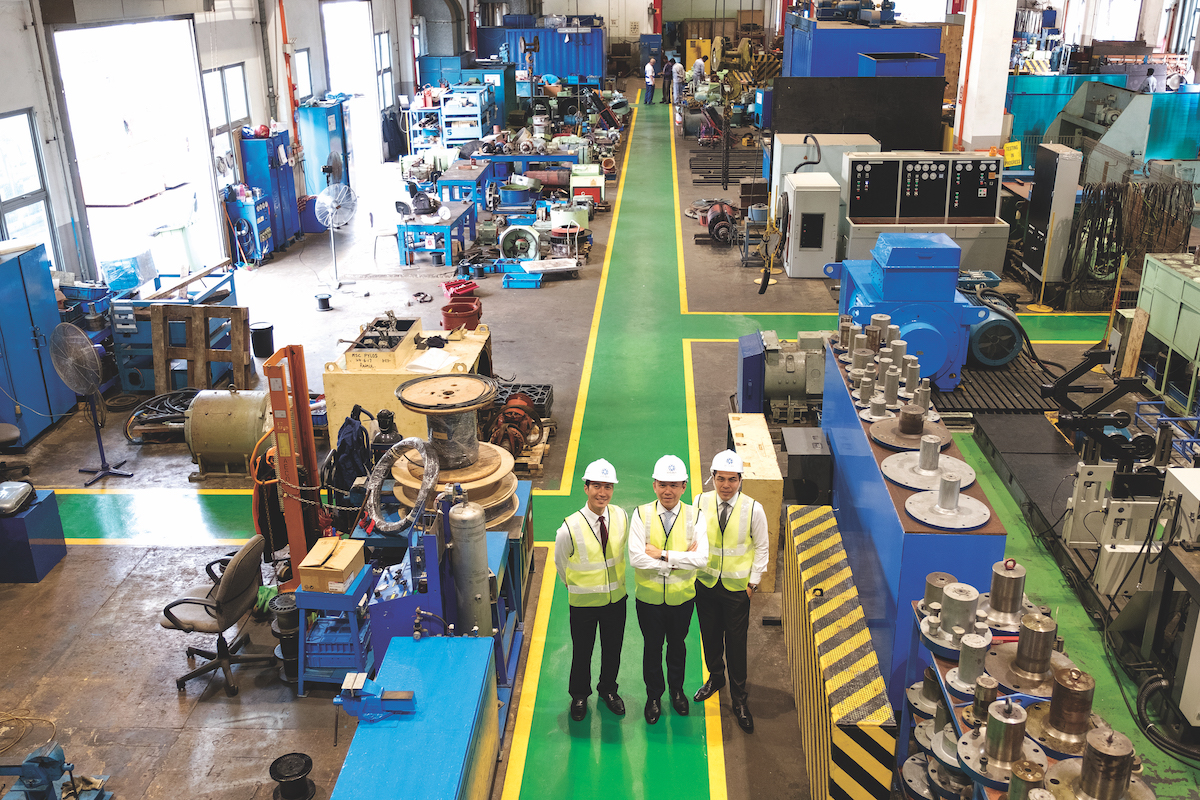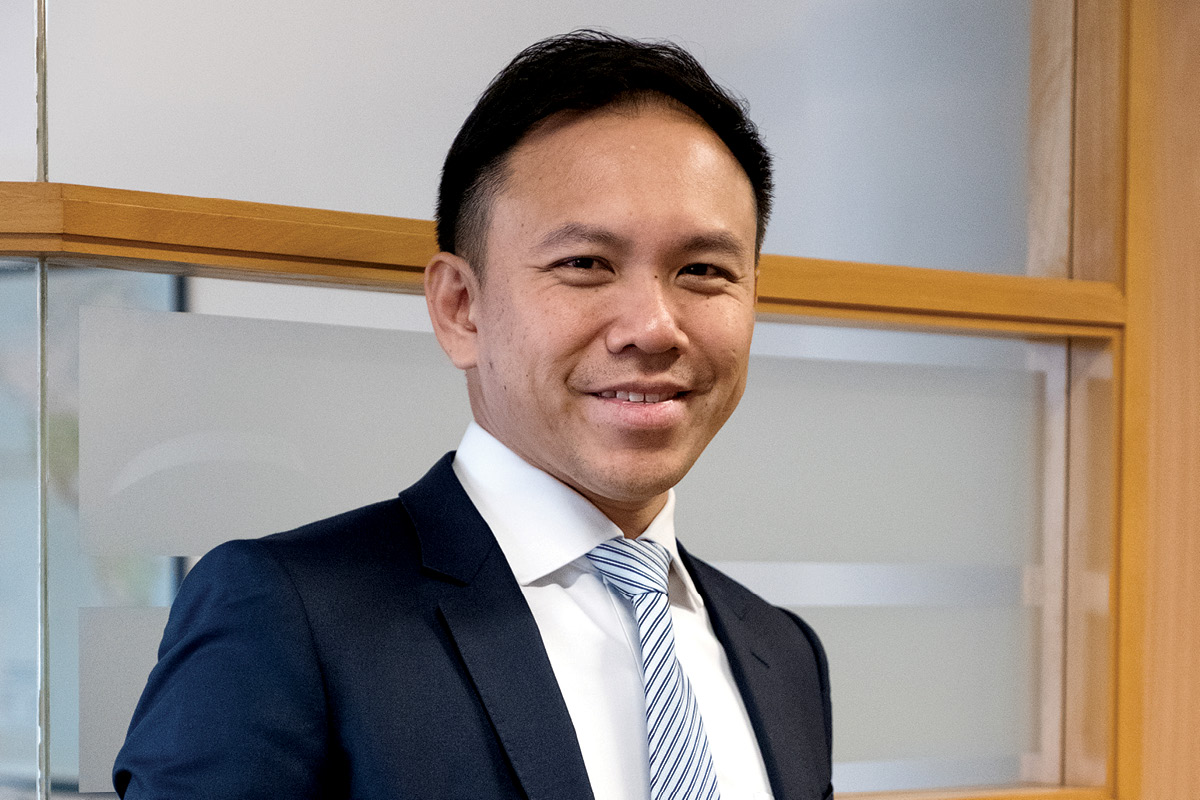Melvin Tan, Managing Director and CEO of Cyclect Group, is a third-generation owner determined to make his mark on the family business and do things a little differently. “It’s my turn to bring Cyclect to the next level, and I don’t want to miss a single opportunity,” he says. Under his stewardship, the firm has diversified from its marine and offshore roots to the booming businesses of renewable energy and engineering services, robotics and automation for the aviation and logistics sectors. Now Cyclect’s thousands of clients and 700 staff are spread throughout nine countries.
Founded by his grandfather Tan Ai Meng in 1943 in the midst of the WWII Japanese occupation, Cyclect started out as a handyman and appliance business in Singapore – a prime location for the budding engineering industry.
It has since grown into a regional group and a trusted partner across the infrastructure, marine and offshore, industrial, building and special events sectors. The company was taken over by Melvin’s father in the 80s.
Melvin Tan sets a transformation journey in progress at Cyclect
“My very first job was with Cyclect as a management trainee,” says Melvin. “I was studying business and information technology in Canada in 1996 when I received a call from my father urging me to return to the company to help with the business. “When I arrived, the company’s primary business was in ship repair, a sunset industry. That period also saw the rise of electrical engineering businesses.”
In the mid 2000s, the company experienced severe financial challenges caused by poor economic conditions, some poor investments, and loss of key talent to its clients. “This crisis peaked in 2006, just as I took over as managing director,” adds Melvin. His priority was to stabilise the finances of the company and reassure the staff. “I was worried that the performance of our team would be greatly affected by the lower morale. A company is only as good as its people,” he says.

Melvin met with every single one of his then 200 staff to make them feel safe and valued, and to determine exactly what internal issues they were facing. “I wanted the truth – not what people thought I wanted to hear,” he says. “My objective was to truly understand the underlying root causes and to tackle them head-on.” Melvin transformed the company’s outdated internal processes, equipment and training programs in an effort to boost productivity and performance and stay ahead of competitors.
“The knowledge and skills were in the minds of our team leaders, but they had never been built into a functional process,” says Melvin. “I set in motion the journey to transform the company from one that was reliant on knowledgeable individuals to one that was collaborative and process-oriented.”
Cyclect Holdings turns its eyes towards a promising future
He then turned his attention to securing projects to build revenue. “First, we reassured existing clients of our commitment to performance, quality and service. Simultaneously, we sought out new clients, market sectors and business opportunities,” he says. “I never doubted the abilities of our people, only the state of the market.”
Cyclect acquired several clients that played a key role in the company getting back on its feet: a global semiconductor foundry, a night street sportscar racing event, and the world’s most prestigious integrated casino and resort. “Without the hard work and resilience of our team, we would have never achieved those crucial wins.”
On the back of the 2007 construction boom, Cyclect left its economic struggles behind and turned its eyes towards a promising future. But Melvin refused to get comfortable: “We’ve never had an ‘I made it’ moment because I’m always looking at what we can do better,” he explains.
“I was beating myself up for not becoming a specialist engineer when a wise friend told me that being a ‘jack-of-all-trades, master of none’ is an advantage. I’m a lifelong learner and this has given me a lot of insight into the needs of different people, markets and cultures.
We’ve never had an ‘I made it’ moment because I’m always looking at what we can do better.
“We have been in Brunei and Malaysia for three decades, where we have established strong footholds, and we are seeing exciting new growth throughout Asean and China,” says Melvin.
Automation & robotics provide a competitive advantage
“Our company specialises in five major business lines: engineering and construction; technical services; energy; facility and plant maintenance; and product distribution. Innovation is of particular importance as we develop new technology for clean energy, automation and robotics to develop our competitive advantage,” explains Melvin.
Cyclect is also looking at robotic and automation solutions to improve baggage handling, performing tasks that use human resources inefficiently. “We are particularly proud of these projects because they will potentially make a significant difference to a great number of people.”
Nevertheless, Cyclect has not forgotten its roots in the business of ship repair. “We have worked on thousands of vessels in the global marine industry and now have a reputable standing as a highly reliable service provider,” says Melvin.
Since its first contract with the Royal British Navy in 1957, Cyclect has served thousands of customers in the industry, including global shipping companies, shipyards, FPSO (floating production storage and offloading) units and oil rig operators. “Our business is diverse and challenging, and this speaks to the capability of our people to deliver.”
Cyclect is a two-time winner of the Prime Minister’s Office TEC Innovator Award, and has also been honoured with the Enterprise 50 Award, Asean Federation’s Best Contractor Award, World Intellectual Property Organization Award, Singapore Sustainability Award, Asean Award for Innovation, as well as dozens of safety awards.
Innovation is essential
After two decades of steering Cyclect through the ups and downs of economic cycles and changing industries, Melvin has learned one key lesson: innovation is essential. Looking to the future, he is focusing on two main areas for growth.
“The first is sustainable clean energy, a necessary resource for the building, infrastructure, marine and offshore industries,” he says. Melvin saw this new sector as a natural progression from the company’s traditional bastion of oil and gas.

In March 2017, Singapore overtook tech Mecca Silicon Valley as the World’s no. 1 for start-up talent. The report by startup genome, a us-based organisation, credits Singapore’s innovative policies for the success of its 1,600–2,400 tech start-ups.
Today, Cyclect’s green technology, cogeneration and waste-to-energy installations continue to reduce carbon dioxide emissions by more than 16,000 tonnes per year. Melvin is constantly looking for expansion opportunities and long-term partnerships with energy consulting companies or distributors of energy-efficient products to ensure Cyclect stays ahead of the curve.
“The second growth area is in automation and robotics to meet the challenge of population ageing and manpower shortages,” says Melvin. “These problems are becoming more apparent every year in industries requiring physical labour.” In May 2017, Cyclect debuted its LINQ convoy robots, designed to autonomously transport people and baggage within an airport with minimal human intervention.
Becoming the region’s go-to engineering hub
This innovation is ideal for the aviation industry, where it often requires several people to move individual wheelchairs around the airport, but it can also be customised for other industries. Cyclect was also a finalist in the Changi Aviation Challenge, helping to develop an innovative system to automate the baggage handling of narrow-body aircraft and increase productivity by 30%.
“Singapore is at the heart of Asia’s aviation, finance, marine and technology industries, so it is our aim to become the go-to engineering hub in the region,” says Melvin. Cyclect is working hard to develop the Asian story, made easier by its strong connections in the region.“We have a good business network throughout Asia and we continue to build on each other’s strengths.”
Melvin explains that a collaborative leadership style has been vital to keeping the company strong. “I’m sensitive to the requirements of my team, so there’s a strong element of trust and mentorship rather than management,” he says.
“Our workplace culture is derived from a time of historical significance, and we have many devoted staff who have served our company for decades. Through the highs and lows, our people have remained loyal and hardworking, and that is what I am most proud of.” While Cyclect’s departments span diverse industries and countries, the company is held together by one common core competency: family.



